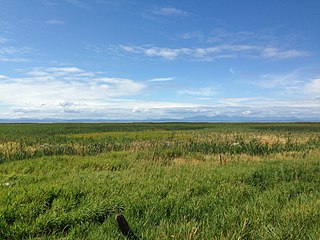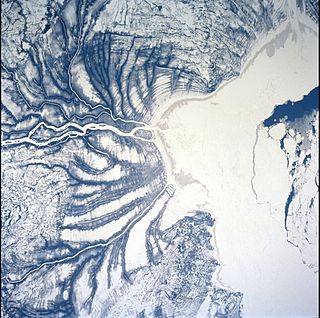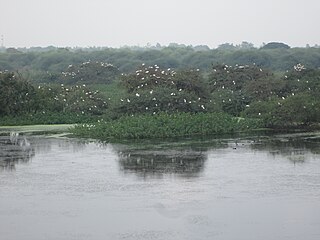
Kolleru Lake is one of the largest freshwater lakes in India located in state of Andhra Pradesh and forms the largest shallow freshwater lake in Asia. 15 kilometers away from the Eluru and 65 km from Rajamahendravaram, the lake is located between the Krishna and Godavari deltas. Kolleru Lake is located in Eluru district. The lake is fed directly by water from the seasonal Budameru and Tammileru streams, and is connected to the Krishna and Godavari irrigation systems by over 67 major and minor irrigation canals. This lake is a major tourist attraction. Many birds migrate here in winter, such as Siberian crane, ibis, and painted storks. The lake was an important habitat for an estimated 20 million resident and migratory birds, including the grey or spot-billed pelican. The lake was declared as a wildlife sanctuary in November 1999 under India's Wildlife Protection Act of 1972, and designated a wetland of international importance in November 2002 under the international Ramsar Convention. The wildlife sanctuary covers an area of 308 km2.

Vembanad is the longest lake in India, as well as the largest in the state of Kerala. The lake has an area of 230 square kilometers and a maximum length of 96.5 km.

The R42 is a provincial route in South Africa that connects Vanderbijlpark with Bronkhorstspruit via Vereeniging, Heidelberg, Nigel and Delmas.

Nal Sarovar Bird Sanctuary, consisting primarily of a 120.82-square-kilometre (46.65 sq mi) lake and ambient marshes, is situated about 64 km to the west of Ahmedabad near Sanand Village, in the Indian state of Gujarat. Mainly inhabited by migratory birds in winter and spring, it is the largest wetland bird sanctuary in Gujarat, and one of the largest in India. It was declared a bird sanctuary in April 1969.

The City of Ekurhuleni Metropolitan Municipality is a metropolitan municipality that forms the local government of the East Rand region of Gauteng, a large suburban region east of Johannesburg. Ekurhuleni means "place of peace" in XiTsonga. Ekurhuleni is one of the five districts of Gauteng and one of the eight metropolitan municipalities of South Africa. The seat of Ekurhuleni is Germiston and the most spoken language is Zulu at 28.6%. The city is home to South Africa's busiest airport, OR Tambo International Airport, which is in the Kempton Park area of Ekurhuleni.

Dipor Bil, also spelled Deepor Beel , is located to the south-west of Guwahati city, in Kamrup Metropolitan district of Assam, India. It is a permanent freshwater lake, in a former channel of the Brahmaputra River, to the south of the main river. In 1989, 4.1 km² of the area was declared a wildlife sanctuary by the Government of Assam. It is listed as a wetland under the Ramsar Convention which designated the lake as a Ramsar Site in November 2002 for undertaking conservation measures on the basis of its biological and environmental importance.

The Alaksen National Wildlife Area is located on Westham Island in the city of Delta, British Columbia. It is an important stopover point for many species of birds migrating along the Pacific Flyway.

Southern James Bay is a coastal wetland complex in northeastern Ontario, Canada bordering James Bay and Quebec. It was designated as a wetland of international importance via the Ramsar Convention on May 27, 1987. The shallow waters of the James Bay region represent an important late autumn staging area for migratory, Arctic-breeding waterbirds.

Dewey Soper Migratory Bird Sanctuary, or Dewey Soper, is a migratory bird sanctuary in the Qikiqtaaluk Region, Nunavut, Canada. It is located in western Baffin Island, from Bowman Bay to the Koukdjuak River, and is named in honour of zoologist J. Dewey Soper. It is an 8,159 km2 (3,150 sq mi) area that was classified a wetland of international importance via the Ramsar Convention on May 24, 1982. The bird sanctuary supports nearly 30% of the breeding geese in Canada, making it the largest goose colony in the world. Up to two million birds of various species use the area for summer nesting, and it is also "habitat for one of Canada's major barren-ground caribou herds". The sanctuary was established in 1957, and is subject to the Nunavut Land Claims Agreement, which defines and governs ownership, land use and hunting rights in the area.
Sandi Bird Sanctuary is a bird sanctuary in Hardoi district of Uttar Pradesh, India.

Harike Wetland also known as "Hari-ke-Pattan", with the Harike Lake in the deeper part of it, is the largest wetland in northern India in the border of Tarn Taran Sahib district and Ferozepur district of the Punjab state in India.

Marievale Bird Sanctuary is a protected area in Gauteng, South Africa. It is about 15 km2 in size, and situated on the East Rand on the southern half of the Blesbokspruit wetland, a Ramsar site. The Blesbokspruit is a major perennial river in Gauteng which is flanked by extensive floodplains on either side. Nearby is the Suikerbosrand Nature Reserve.
Crooked Tree Wild Life Sanctuary (CTWS) is a protected area in Belize. It is recognized as a Wetland of International Importance. It was designated as a waterfowl habitat on April 22, 1998, under the Ramsar Convention on Wetlands. During Belize's dry season many resident and migratory birds find refuge in the lagoons. The sanctuary contains 16,400 acres (6,600 ha) of lagoons, creeks, log wood swamps, broad leaf forest and pine savanna, home to hundreds of species of wildlife. The sanctuary protects globally endangered species including the Central American river turtle (locally known as hicatee), Mexican black howler monkey, and yellow-headed parrot.

Vaduvoor Bird Sanctuary is a 128.10-hectare area located in Vaduvoor lake, Mannargudi Taluk, Thiruvarur District, Tamil Nadu, India. The sanctuary is about 25 kilometers from Thanjavur and 14 kilometers from Mannargudi on the Thanjavur-Kodiakkarai State Highway 63. It was created in the year 1999. The irrigation tank receives water from November to April every year which attracts numerous foreign birds from Europe and America. The sanctuary attracts more than 40 species of water birds like the white ibis, painted stork, grey pelican, pintails, cormorants, teals, herons, spoonbills, darters, coots, Open bill storks, and pheasant–tailed jacana. The sanctuary is a favorite spot for the migratory birds and during the months of November and December more than 20000 winged visitors reach this area. The sanctuary has basic facilities for tourists to stay overnight and enjoy watching the birds from the two watch towers.

Moulting Lagoon Important Bird Area is a composite wetland site in eastern Tasmania, Australia. It comprises two adjacent and hydrologically continuous wetlands – Moulting Lagoon and the Apsley Marshes – at the head of Great Oyster Bay, near the base of the Freycinet Peninsula, between the towns of Swansea and Bicheno. Both components of the site are listed separately under the Ramsar Convention as wetlands of international significance. Moulting Lagoon is so named because it is a traditional moulting place for black swans. It is an important site for waterbirds.

Khijadiya Bird Sanctuary is a bird sanctuary located in Jamnagar district of Gujarat, India. About 300 species of migratory birds have been recorded here.

Kolleru Bird Sanctuary is a sanctuary in Andhra Pradesh, India. It covers 673 square kilometers. It was established in November 1999, under the Wildlife Protection Act of 1972. The sanctuary protects part of the Kolleru Lake wetland, which gained Ramsar Convention for International importance in 2002.

Lake Utonai is a shallow freshwater lake in Tomakomai, Iburi Subprefecture, Hokkaidō, Japan. It is within the Lake Utonai Sanctuary, created in 1981 as the first bird sanctuary designated in Japan. It later became the fourth Ramsar site in Japan in 1989.

Haiderpur wetland is a UNESCO Ramsar site located near the Bijnor Ganga Barrage within the Hastinapur Wildlife Sanctuary in Uttar Pradesh, India.


















